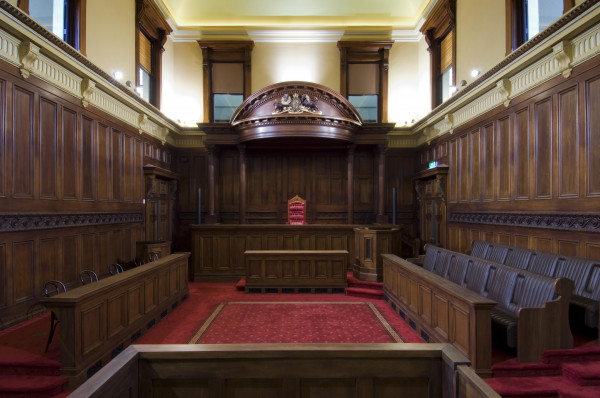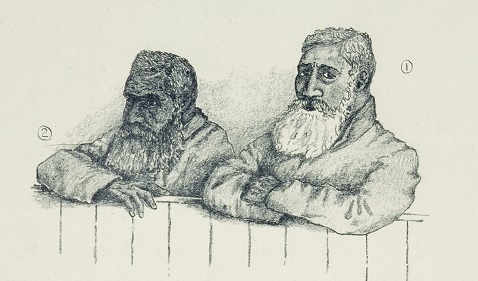The Old High Court – Te Whiti and Tītokowaru
After what was reported as “Serious Native Aggression at Manaia”, the prophet of Parihaka, Te Whiti-o-Rongomai, Ngāti Ruanui leader Riwha Tītokowaru and eight followers appeared in the Old High Court in October 1886 after being charged with forcible entry and riot.
The Battle of Hastie’s Farm
In July 1886, about 500 supporters of Te Whiti and Tītokowaru entered a farm that had been claimed by Alexander Hastie, who had settled near the rural Taranaki town of Manaia with his family.
Five years earlier, armed constables invaded the pacifist settlement at Parihaka, where Te Whiti and others were detained without trial for 16 months. As part of their non-violent resistance to Pākehā settlement in the area, Māori erected a whare and 18 tents on Hastie’s farm and brought firewood with them to cook dinner. They invited some of the Pākehā to dinner, including a local constable, but most declined. Pākehā from Hāwera then started arriving in more force and soon they were almost equal in number to Māori.
Pākehā horsemen rounded up 20 cattle and 65 of the 150 horses belonging to the supporters. Some of the horsemen used their stock whips on the supporters and their cattle. Many Pākehā used their clubs freely; up to three Māori had their heads severely cut. The horses and cattle were driven to the pound some distance away.
By late afternoon, Pākehā had greatly outnumbered the Māori. Special constables were sworn in and Māori leaders were arrested. The remaining Māori left the area, showing no resistance.
“Seeing the bad plight in which some of the Māori were likely to be for want of horses to take food to the nearest kainga, 1 or 2 of the settlers offered to subscribe a pound or 2 to help them to release some of them. The natives, however, said they would take no money until they had talked over the affairs. The night will be cold, and many of them will probably be exposed all night with little shelter or clothing. Your reporter rode 7 miles in under half an hour with the object of getting this message away in time for the telegraph.”
- The Evening Post, 6 October 1886
Inspector Pardy, the officer in charge of the area, took control of the prisoners.
Appearance in the Old High Court
In October 1886, Te Whiti, Tītokowaru and eight followers appeared in the Old High Court in front of Chief Justice Prendergast. Te Whiti was charged with inciting the other prisoners to enter on the land that Hastie had claimed. Through an interpreter, Te Whiti tried to explain to the court why he “put [his] hand on” the land, but Chief Justice Prendergast dismissed the explanation, reminding the accused that he must enter a plea. Te Whiti eventually pleaded guilty, as did Tītokowaru and the other 8 defendants.
|
Detail from a drawing by Walter Jefferson Leslie at the trial of Te Whiti [Wellington]. The Evening Press 1886. Ref: B-034-015 Alexander Turnbull Library, Wellington, New Zealand. Titokowaru (left) Te Whiti (right) |
Before being sentenced, Te Whiti was asked to address the court. He said:
“I am the original owner of the land. You, the white-faced people, came in a cloud, or army, and turned me off the land. When I got sufficient courage to re-enter, my hand was put forth again. We and others were expelled from the land. We were not expelled peaceably, but by the guns of the Government. When I rose from the ground, the pain of the blow I received was still great, but I still put out my hand. I was then tried by law, but those who turned me from the land were not tried. That is all I have to say to your Honour – not many words.”
In handing down a lenient sentence, Chief Justice Prendergast warned Te Whiti that a “much severer” sentence would be passed if another, similar charge was brought against him. The judge said that Te Whiti must have thought his actions were “little short of levying war against the Crown” and that resistance from Pākehā settlers would have been inevitable. “I have nothing to do with any supposed wrong you have against the Crown; all I have to do is to take into account the facts upon which this prosecution are based,” the Chief Justice said.
Te Whiti was sentenced to imprisonment for three months and fined £100 ($25,000). The others were sentenced to imprisonment for one month and fined £20 ($5,000).
---------------------------------------------------
The above account is taken from newspaper reports of the event and the court case which appear on the National Library website in the Papers Past section.
Resources
- Serious Native Aggression at Manaia, The Evening Post (19 July 1886)
- The Māori Rioters in Court, The Evening Post (6 October 1886)
- The trial of Te Whiti, drawing by Walter Jefferson Leslie, The Evening Post (1886)

Find a PDF version of this page for download here:
The Old High Court – Te Whiti and Tītokowaru (PDF, 2 MB)

